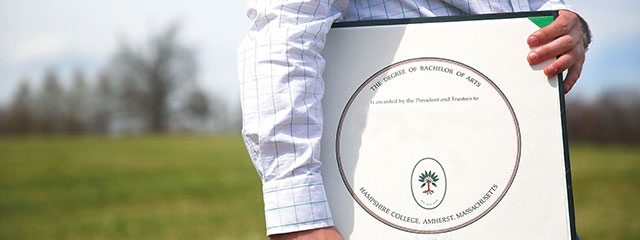Hampshire College President Jonathan Lash recently blogged for the Huffington Post on how our education models must keep up with a rapidly evolving world.
Here we are, midway into the second decade of the 21st century and growing ever closer, by connection if not through understanding. Money, goods, ideas and images flow freely across borders, creating both acquaintance and conflict.
The pace of change is accelerating. By one estimate, the amount of new technical information doubles every two years, and 70 percent of today’s students will end up in jobs that have not yet been invented. They will collaborate with people on multiple continents through institutions not yet created, struggling to solve problems we do not yet recognize. The skills needed for our rapidly changing world will not be learned through the old models.
Preparation to succeed and contribute in this fast paced, often confusing global environment requires education that provides more than narrow job training and efficient information transfer. Such rapid change requires intelligence that is creative, adaptive, and thrives on challenge. More than ever before, students will need to know how to think, evaluate, and explore, even as what they think about may change and expand. They will need the creativity and the courage to challenge traditional ways of doing and working, and forge new paths and solutions.
The boundaries of traditional academic disciplines no longer map onto the radically interdisciplinary topography of today’s pressing problems and concerns. Climate change, the nature of consciousness, income inequality, the challenge of providing more and healthier food to a growing global population, the discovery of new planets: All of these issues demand collaborative, cross-disciplinary responses.
Every responsible and informed citizen will need to be able to understand and assess the scientific findings that inform every facet of our lives, from global politics, public policy and medicine, to what we eat, what we throw away, and how we get to work.
Historical, cultural, and geopolitical frameworks are profoundly important to the 21st century citizen navigating changing landscapes locally and globally. Culture shapes reality. Literature and the arts enable us to understand and address the complexity, contradictions, and challenges of our world. Information is changing — more, faster, unfiltered, leaving the individual to sort through and make sense of it all.
Emphasizing direct pre-professional training at the undergraduate level is the worst possible idea for today’s 18-year-old, placing short-term employability above long-term outcomes for both the individual and society. Stressing marketability over creativity runs contrary to the demands of tomorrow’s economy. One recent survey of global business leaders ranked creativity as the most important factor for future success, and high tech companies increasingly search for graduates with broad backgrounds and creative skills, rather than narrow technical training.
In a global marketplace of ideas students will need to take up different perspectives and forge an ethical stance that is sensitive to cultural difference while guided by principles of fairness, justice, and welfare.
What educational approach will work for this world?
- One in which students are actively involved in their education. Knowledge is not something to be passively received and codified; it is to be sought out, questioned, created, and investigated. Students need to be engaged in the processes of asking, acquiring, analyzing, and adding to knowledge. What one needs to know is subject to a rapidly changing world, but the “how” and the “why”–the core skills needed to acquire, evaluate, and add to knowledge–once instilled become the basis for creative engagement with the world. Don’t just sit there: Ask, question, explore, rethink, argue–learn the process of learning!
- One in which students build on their curiosity, transcend disciplinary boundaries, follow ideas where they lead, and join a community of co-discoverers. Students need to negotiate their own educational paths with their teachers, working together to forge an educational plan that is rigorous, coherent, and interesting. Learning in this way is reciprocal and hands-on. Collaboration and dialogue mark the learning environment. The imperative to work with and persuade mentors makes students entrepreneurial, self-reliant, and adaptive. They will be comfortable finding new approaches and inventing new careers.
- One that is not merely interdisciplinary, but also intellectually and artistically agile. The question or problem, not the structure of an academic field, drives the student’s inquiry. They are encouraged to see how artistic endeavors are enriched and informed by ideas in mathematics and the sciences, or how scientific findings might be contextualized and made more complex by the humanities and social sciences. The hallmark is: inquiry and discovery without boundaries.
- One that creates lifelong learners who have internalized their motivations and goals. Education for the whole person creates informed citizens who act to create positive change in the world, whether through political activism, scientific discovery, artistic creation, or sustainable entrepreneurship–people with a moral compass and a passionate belief in their capacity to make a difference.
Graduates who are trained to address tough situations with ingenuity, entrepreneurship, and a capacity for mobilizing collaborative thinking and cooperative action are the most valuable contribution any school can make to society. Such students live with a fierce sense of the obligation of justice.






